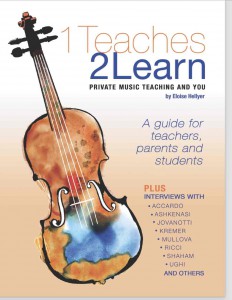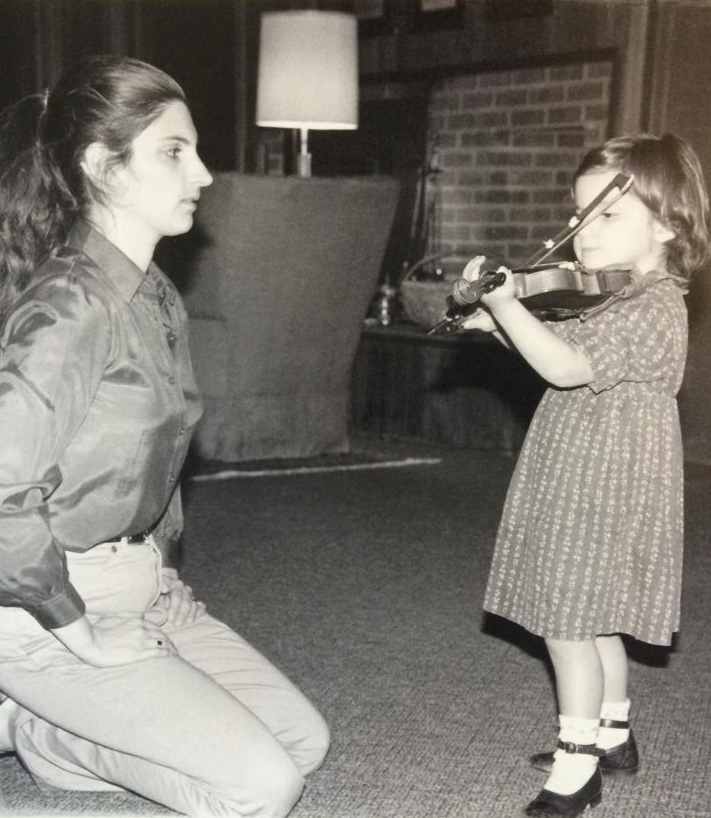It's Not My Job
Sometimes a question comes up that essentially asks us to consider what our job as instrument teachers is, and what it isn’t. For example, when is it appropriate for us to make decisions for our students?
Recently, I saw a post from a teacher who was very upset because she had just found out that her very young student was having lessons in two other instruments besides her own. She said that she would never have accepted this child as a student if she had known.
I can see how she feels: I have had my fair (or should I say, unfair) share of “competition” from other instruments and activities. When, if ever, is it right for us to decide that something is too much for a child? When should we act in what we perceive to be the child’s best interests?
I know a lot of teachers will disagree with what I’m about to say here, but let me play the devil's advocate for a minute. It does all of us good (especially me) to consider other points of view. Maybe no one will change his or her mind, but at least we may become a little more aware that when we make a decision for ourselves (because we don’t want to teach failure), we are also making decisions for other people. And the perhaps unintended consequences, which we may never see, could be disastrous at worst or life-changing at best for some.
First, let’s ask ourselves if we refuse a child, are we doing what’s right for the child or what’s right for ourselves? Yes, it can be frustrating if a child doesn’t practice enough or his parents don’t give enough consideration to our excellent teaching.
However, we might take the following factors into consideration (and maybe do some soul-searching) the next time we feel we need to make a decision.
- Are we worried that the child won’t succeed—or that we won’t?
- Indeed, what is our definition of success?
- If we are being paid to do our job, is it really up to us who we will teach and who we won’t? What would a doctor or lawyer do? How are we any different from any other professional in a service industry?
- How do you know that the parents are making a mistake? Are you really so sure?
- What if said student is a born violinist (or whatever your instrument is)? How will the student ever know if you don’t let him try?
- How will the parents ever decide that they prefer your teaching to the others if you don’t let them in the door?
- Why is it such a bad idea to do more than one instrument? My daughters, both fine violinists with MMs in performance, studied two instruments for many years as well as dance and volleyball. Also, I know a prominent teacher with advanced performance degrees from a prestigious conservatory in both the piano and the violin, who has umpteen qualifications to teach both and was a committed dancer as well. What if any of her teachers had turned her away?
- What gives us the right to make decisions for others? Unless we are really only making the decisions for ourselves.
- What’s the difference between a child studying three instruments or studying only one and having two other time-consuming activities? Soccer, gymnastics, ballet, or even school anyone?
- Cannot two or even three instruments enhance a child’s education? How many composers and conductors don’t or didn’t play any one instrument particularly well?
The teacher in question was upset because she didn’t want to be party to what she saw as a mistake. I can understand that, as I have been in that same situation.
However, in the various decades I have been teaching, I have learned a few lessons myself.
- I don’t know everything.
- It’s not my call: it’s the parents’.
- My frustration is not as important as the well-being of the child.
- Managing frustration, mine and theirs, is part of being a teacher.
- Better not to get frustrated in the first place. How?
- I won’t get frustrated if my focus is on the student instead of how I feel about him and his parents. (Yes, I know how overwhelming those feelings can be.)
- Parents are a lot smarter than we may think, know more about their children than we may think, and sometimes are just fishing around to find out what the child really likes or which teacher is the most appropriate for their child.
- These things have a way of sorting themselves out without me taking any particular action that could upset anyone; refusing a child can be a trauma, no matter how well-intentioned a teacher is.
- It’s not my job to define success for others.
Of course, I had to learn all the above the hard way. Luckily my instincts have helped me. How many times have I seen children involved in what I thought were too many activities but I persisted anyway? Lots. Sometimes you pull one out of the fire, and other times you don’t. But if you don’t try???
Two cases come to mind of ex-students who studied the piano, violin, and singing with equal intensity. I didn’t agree with how the mothers went about this, but after I expressed a mild opinion, I kept my mouth shut. What happened? After four or five years, both children decided to play the violin as their principal instrument. They are both professional violinists now. What if I had taken a stand?
Another case really did put me to the test: a piano and violin student with a really ambitious mother. When he got to a certain level on the piano, the mother took him to a likewise ambitious teacher who announced that he would take on this eight-year-old only if he practiced 3 hours a day. Yep, you heard me right: THREE HOURS A DAY. This teacher didn’t want to “waste his own time,” you see. The mother, star-struck, agreed and they started lessons.
Did this end well? No—not in any way. The little boy studied his piano dutifully three hours a day, but he did very little on the violin. I could see the handwriting on the wall. Yes, he did quit the violin at the end of the year. Did I warn the mother that three hours a day on any instrument was too much at that age? I certainly did, especially since I could see that he was no prodigy (but I certainly didn’t tell her that). Did I warn her that he would wind up quitting the violin? I sure did. Did she listen to anything I had to say? No, she did not.
What did I do? Nothing. Nothing at all. I waited to see how it would play out. What happened was in my view tragic. This child wound up becoming very proficient at the piano—winning lots of those little local competitions (where his teacher was on the jury). He grew up but went nowhere with the instrument and wound up rebelling against his mother. Well, you can’t win’ em all. But the big loser, in this case, was the student. My heart still goes out to him after all these years.
Why am I mentioning this “failure?” Because it wasn’t my call. All I could do was express an opinion and wait. This child needed some compassion. He got it from me but nowhere else. I gave him the chance to make up his own mind even though I knew I was fighting a losing battle. For me to have truncated our relationship would not have helped him at all. It was certainly no help to my studio for everyone to know that he “preferred” the piano. He didn’t really, but his teacher was/is an ambitious fellow who only thinks of his own reputation, and his promises of success were very seductive. It would have been very easy for me also to have convinced the boy’s mother that he was a prodigy on the violin—all he needed to do was practice three hours a day… I can't bring myself to do this even when it’s obvious a child is prodigious, which this little boy, while talented, was not (but I could have been wrong).
The good outcome was that I have a clear conscience, which I have found is more important to me than my reputation, my comfort, and my frustration level.
We are teachers. We are not all-knowing or all-seeing. We are not the child’s parents. At the end of the day, parents make decisions for their children. We can advise and inform them. But deciding for them is not our job.
Unless the only person you’re really worried about is yourself. Some of us are more concerned about how we want to teach instead of what and how other people want to learn—more interested in short-term goals instead of the long race and more interested in our definition of success without allowing other interpretations. If these are your main concerns, go ahead and issue ultimata. But know that you may be depriving yourself of the chance to win one for your instrument and the child of a unique opportunity: studying with you.
Share this:
Buy it on www.sharmusic.com - eBook format, avaliable worldwide, paperback in North America
COPYRIGHT
ABOUT
A music teacher’s thoughts and observations on the teaching and the study of a musical instrument, hoping to be of help to parents, students and teachers.
PHOTO
AWARDED TOP 25 VIOLIN BLOG
CATEGORIES
TAGS
ARCHIVES
-
Agosto 2022
Agosto 2023
Agosto 2024
April 2015
April 2016
April 2017
April 2019
April 2020
Aprile 2022
Aprile 2023
Aprile 2024
August 2014
August 2015
August 2016
August 2017
August 2018
August 2019
August 2021
December 2014
December 2015
December 2016
December 2017
December 2018
December 2019
December 2020
Dicembre 2022
Dicembre 2023
Dicembre 2024
Febbraio 2022
Febbraio 2023
Febbraio 2024
February 2015
February 2016
February 2018
February 2019
February 2020
February 2021
Gennaio 2022
Gennaio 2023
Gennaio 2024
Giugno 2022
Giugno 2022
Giugno 2023
Giugno 2024
January 2015
January 2016
January 2017
January 2018
January 2019
January 2020
July 2015
July 2017
July 2019
June 2016
June 2017
June 2018
June 2019
June 2020
June 2021
Luglio 2022
Luglio 2023
Luglio 2024
Maggio 2022
Maggio 2023
Maggio 2024
March 2015
March 2016
March 2017
March 2018
March 2019
March 2020
March 2021
Marzo 2022
Marzo 2023
Marzo 2024
May 2015
May 2016
May 2018
May 2019
May 2020
November 2014
November 2015
November 2016
November 2017
November 2018
November 2019
November 2021
Novembre 2022
Novembre 2023
Novembre 2024
October 2014
October 2015
October 2017
October 2018
October 2019
October 2020
October 2021
Ottobre 2022
Ottobre 2023
Ottobre 2024
September 2014
September 2015
September 2016
September 2018
September 2019
September 2020
September 2021
Settembre 2022
Settembre 2023
Settembre 2024
RECENT POSTS
Terry G and Me, or Terry Gilliam on Where (or What) Practicing the Piano Will Get You…
The Teaching We Don’t Do Is More Important Than We Think
Overwhelmingness or What Teaching and Motherhood* Have in Common
Cellphone Serenity
How to Build Your Reputation – the Kind You Want
Desperate Times, Desperate Measures. Or How to Deal With Your Strong-Willed Stubborn Student and Survive
“Why Does My Teacher Get So Frustrated?” Letter to a Perplexed Student
Mount Rush-no-more….And How to Get There
Realizzato con VelociBuilder - Another Project By: Marketing:Start! - Privacy Policy




